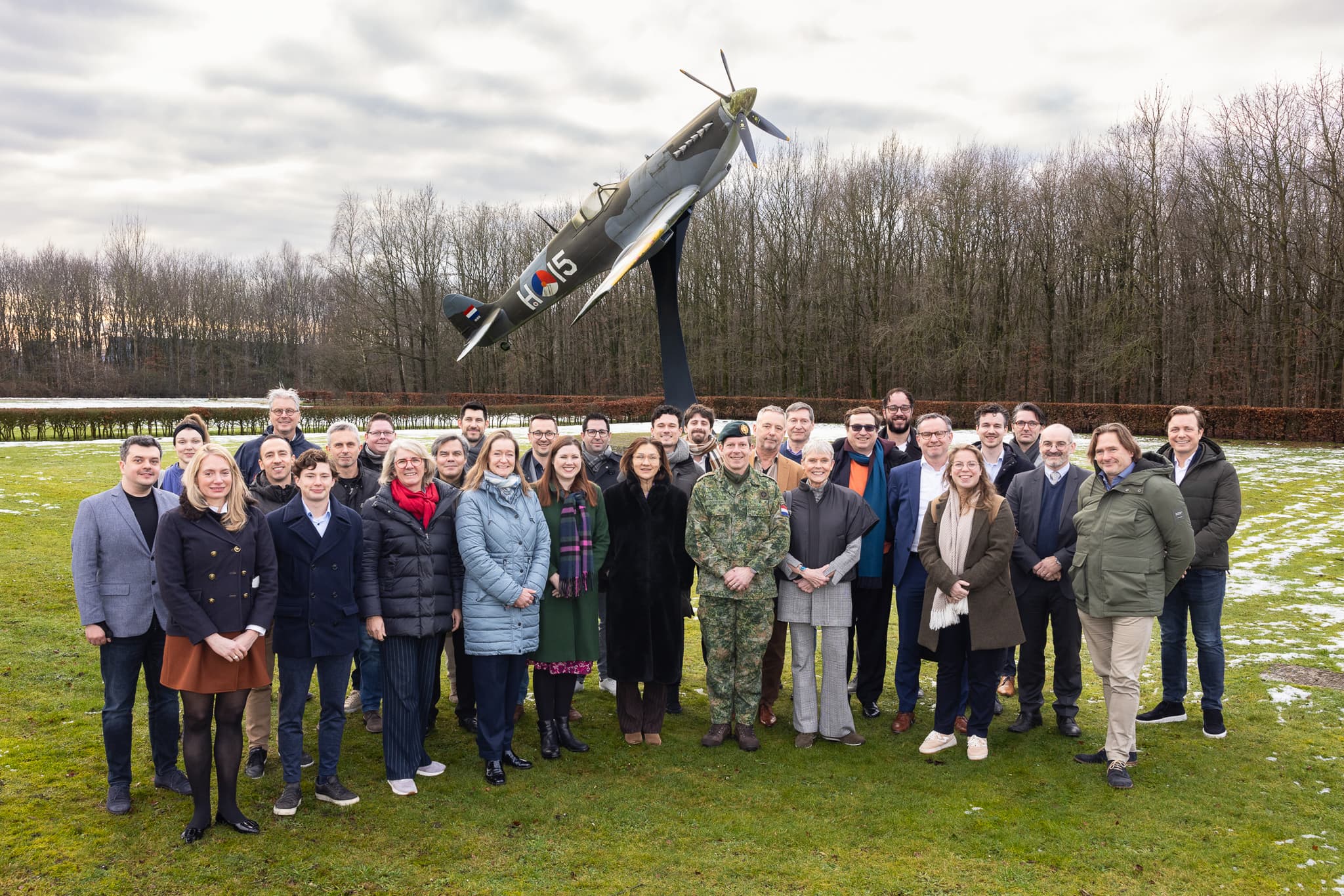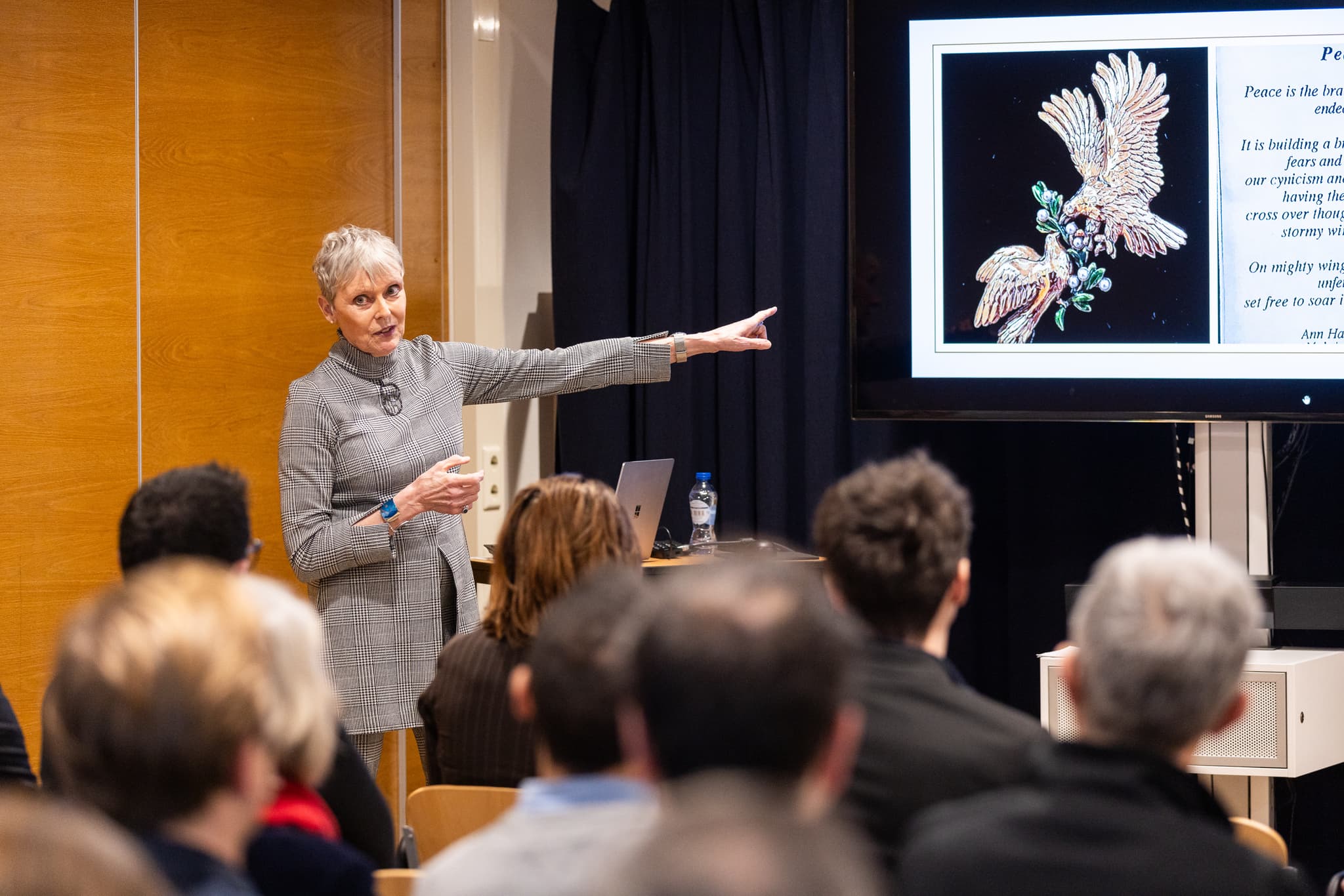Developing new technologies for Defense: NATO's DIANA accelerator launched
Last week, the kick-off of NATO's DIANA accelerator The Gate Brainport Eindhoven took place.
Published on January 21, 2025

Group photo during kick-off. Credits: Nadia ten Wolde
Our DATA+ expert and Editor-in-Chief, Elcke Vels, explores AI, cyber security, and Dutch innovation. Her "What if..." column imagines bold scenarios beyond the norm.
Using synthetic DNA to store digital data. Or drones that need no external connection to perform their tasks. Technology is playing an increasing role in the military world. The kick-off of NATO's DIANA accelerator The Gate Brainport Eindhoven took place recently. The program supports five startups, with a defense and commercial focus, with initial funding of €100,000 per startup to foster their growth.
Last week, all parties involved, including the five selected companies, gathered at the airbase in Eindhoven. Visitors were welcomed with coffee, tea, and a special DIANA cake. DIANA stands for Defense Innovation Accelerator for the North Atlantic, a NATO initiative aimed at accelerating innovative technologies with both civilian and military applications.
Gertie Arts kicked off the event with a keynote. Arts is a strategic advisor on resilience within Defense and also the program manager of the FRONT innovation platform. “We are in a global power struggle, in which technology plays a key role. Like-minded countries must join forces. This is why we have come together: to contribute to this challenge.”
In addition to Arts, several other speakers were given a stage. These included Pieter Cobelens, Major General off-duty and former director of the MIVD, who gave a keynote presentation.
About DIANA
DIANA is a NATO initiative and is implemented in Eindhoven by The Gate (TU/e), BOM, Brainport Development, and a broad network of partners, including FRONT and MIND as the innovation arm of Defense, and the industry organization NIDV. This collaboration provides the necessary expertise and resources to realize innovations that benefit both the defense sector and the broader society. The Gate, an incubator within the Brainport ecosystem is the Accelerator Operator for DIANA startups. It provides access to relevant locations, shared facilities, and a broad and open innovation network available within Brainport.
An extensive selection process
The five selected startups, from different countries within NATO, were chosen after a thorough selection process. More than 2,600 applications were reviewed, of which 75 companies were selected. Five of them are following the program in Brainport. Each company will receive initial funding of €100,000, with the possibility of receiving another €300,000 after successfully completing the first phase. During the program, the companies will also have access to mentoring and testing facilities.

Gertie Arts during the kick-off. Credits: Nadia ten Wolde
Five innovative startups
The five startups pitched their technologies and explained how they can be of value for both defense and commercial applications.
Akheros Sas (France)
Akheros Sas focuses on increasing the reliability of drones through advanced AI technology. Every month, thousands of drones are lost worldwide due to signal interference, severely hampering important missions. Akheros offers an AI-based solution that can be integrated directly into the operating system of drones. The uniqueness of this technology is that it requires no external connection, allowing drones to continue their mission even in areas of interference.
Starnav (France)
Starnav is developing an innovative navigation system. GPS malfunctions can cause serious navigation problems, especially in military operations. The Starnav system combines an inertial measurement sensor and a star tracker to accurately calculate position even in environments where GPS signals are jammed or blocked. The system is rugged, reliable, and can operate both day and night. After three years of testing, the system is ready for installation on French aircraft, and the company hopes to further implement it on other platforms.
SecuBlox GmbH (Germany).
SecuBlox is working to simplify its blockchain infrastructure. The company combines blockchain, AI, and IoT. These technologies connect devices and improve collaboration, which comes in handy in hybrid warfare. In doing so, SecuBlox has developed a platform that enables trusted surveillance. The startup is focused on further developing its technology to strengthen security and cooperation within NATO.
Biosistemika (Slovenia)
BiosiStemika is a pioneer in the field of DNA data storage. This innovative company has developed technology that uses synthetic DNA to store digital data offline in a highly secure manner for thousands of years. In 2022, Biosistemika managed to store all the data of a cryptocurrency wallet in DNA. The company is now focusing on the defense sector to prove the potential of this technology, for example by securely storing crucial data.
Eduworks (United States)
Eduworks focuses on improving military training through AI. It helps defense personnel develop the right skills for their missions, taking into account the changing landscape of modern warfare. Eduworks' platform Lorica has already been selected by the U.S. Army, and focuses on developing AI solutions that can help train operators in complex and disrupted environments, such as those that involve jamming and spoofing. The company is now working to adapt these technologies to support the specific needs of NATO and its member states.
Sponsored
This story is the result of a collaboration between TU/e and our editorial team. IO+ is an independent journalism platform that carefully chooses its partners and only cooperates with companies and institutions that share our mission: spreading the story of innovation. This way we can offer our readers valuable stories that are created according to journalistic guidelines.
Want to know more about how IO+ works with other companies? Click here
